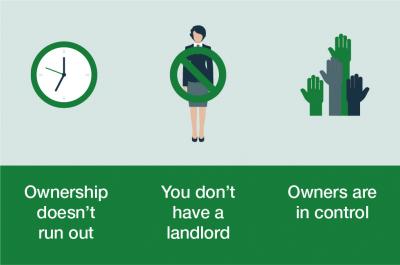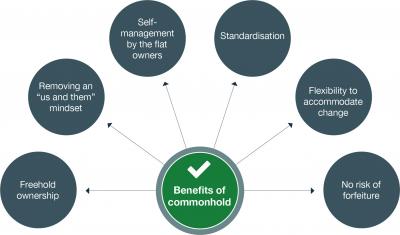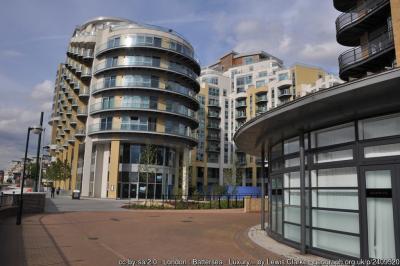On 21 July, the Law Commission published its recommendations for a comprehensive reform of commonhold, which allows for flats to be owned on a freehold basis. The Report was published alongside our two reports on residential leasehold, which are concerned with enfranchisement and the “right to manage” (RTM). Collectively, these reports provide a package of recommendations that would revolutionise how homes – particularly flats – that are currently owned as leasehold are owned in future. That reform contains two equally important strands. First, to provide essential reform to leasehold, so that the law works better for leaseholders; in particular by ensuring that the financial value of the home is placed in leaseholders’ hands, and giving leaseholders control over the management of their homes. Secondly – the focus of this post – to reinvigorate commonhold, so that flat owners in England and Wales can own their home as freehold, as already happens in many other countries. Legal schemes analogous to commonhold, such as “strata” or “condominium” titles, are long-established elsewhere. Freehold ownership of flats is not practically possible in the absence of commonhold because of the need for a legal framework governing ownership and management of common parts, and the need to be able to enforce positive covenants between owners. England and Wales has relied instead on leasehold to provide the legal structure. But leasehold was not designed for this role, and specific instances of bad practices in the market – including 10-yearly doubling ground rents and high permission fees charged to leaseholders when making alterations to their home – have brought into the spotlight long-standing concerns with the tenure. In announcing its intention to ban the sale of houses on a leasehold basis in the future (subject to exceptions) the Government has recognised that, where freehold ownership is possible, leasehold should not be used. Our report on commonhold therefore updates the law so that commonhold is not just a viable alternative to leasehold, but is the preferred alternative.

Commonhold is not a new tenure. Criticism of leasehold as a mechanism for delivering home ownership is long-standing, and a scheme similar to commonhold was first suggested by the Wilberforce Committee’s recommendations in 1965. However, it was not until 2002 that commonhold was introduced by the Commonhold and Leasehold Reform Act 2002 (in force since 2004). However, commonhold has failed to become the chosen mode of home ownership for flats. Of the 700,000 flats built in England since 2002, only around 150 were sold on commonhold tenure.
There are a number of reasons why commonhold has not taken off. One reason is that leasehold unquestionably has advantages for developers and freeholders. When a developer builds a leasehold block, they can both sell the flats to individuals as leasehold, and sell the freehold interest in the building. The freehold is both a capital asset and generates income through ground rent payable by the leaseholders. Other income streams may also arise, such as charging leaseholders permission fees to obtain consent to alterations of their flat. There is no incentive for developers and freeholders to forego these income streams by building and selling commonhold.
In addition, however, it is clear that the current law governing commonhold is not fit for modern, complex developments that involve a mix of residential and non-residential units. In particular, it is not possible for parts of the commonhold to make decisions on, and pay for, things that are only relevant to that particular part. For example, if in a mixed block of commercial and residential units the commercial units want to increase security, the entire block may need to vote on, and then pay for, the change. That may mean that the residential unit owners – who would not benefit from the increase in security, but would have to pay for it – could block the change, leaving the commercial units in an unsatisfactory situation. Further, while the law makes provision for leasehold blocks to convert to commonhold, the unanimous agreement of leaseholders and of holders of certain other property rights in the block is needed. The requirement of unanimity is a practical bar to conversion.

We set out a number of the salient recommendations from the report below. Our report (and a summary of the report) can be read in full on the Law Commission’s website.
Our recommendations will make it easier for leaseholders to convert to commonhold. In particular, conversion to commonhold will be possible with the support of 50% of eligible leaseholders. Furthermore, our recommendations will improve the process of converting, which will prevent tactical delays by those opposed to the conversion and will, importantly, empower leaseholders by putting them in the driving seat of the process.
One tangible benefit of being a commonhold unit owner is that, under our recommendations, each unit owner will have the right to vote to approve the directors’ annual budget. This will give unit owners a greater degree of control over proposed expenditure than leaseholders, who have more limited consultation rights over leasehold expenditure.
Our recommendations will also encourage the use of commonhold in mixed-use developments, by allowing owners with different interests (for example, residential and commercial unit owners) to have a greater say in how their own units are run by the use of “sections” within a commonhold.
Our recommendations for mixed-use commonholds go hand in hand with our proposed reforms to the law on development rights. At present, a development has to be registered in its entirety as a commonhold at the outset. We recommend that, by allowing a developer to register a commonhold in phases, a commonhold association can become the owner of the common parts within a completed phase, leaving the developer free to complete the works on the remainder of the site. This scheme ought to provide greater flexibility when developing a site.
We make recommendations to ensure that commonholds are financially robust, including a requirement that commonhold associations should maintain a reserve fund. Associations may also be permitted to raise finance to cover sudden or emergency expenditure by selling or mortgaging the common parts of the commonhold, thereby relieving the burden on individual unit owners to satisfy immediate payment demands. We also recognise that there are presently gaps in the law governing insurance of commonhold blocks. We therefore recommend that commonhold associations should be able to take out comprehensive buildings, officers’ and directors’ insurance. Public liability insurance should be mandatory as a means of protecting the commonhold association’s solvency.

We acknowledge that our recommendations will not be sufficient on their own to give the necessary impetus to commonhold; but they are an essential step in doing so.
In order to reinvigorate commonhold, Government will need to decide whether (a) to ban leasehold for flats or (b) to provide financial incentives for developers to use commonhold in favour of leasehold. The alternative is to leave commonhold as an option for any developer who wishes to use it, but we fear that doing so would result in little change to the low number of flats that are currently sold as commonholds.
The means by which commonhold is reinvigorated is a political decision for Government. However, we are clear that, in legal terms, commonhold is preferable to leasehold as a mechanism to deliver effective home ownership. It overcomes the inherent limitations of leasehold and our recommendations will ensure that commonhold is tailor-made to regulate a group of interdependent properties.
__________
How to cite this blog post (Harvard style)
Hopkins, N. and Marciniak, S. (2020). Reinvigorating Commonhold: The Alternative to Leasehold Ownership. Available at: https://www.law.ox.ac.uk/research-and-subject-groups/property-law/blog/2020/09/reinvigorating-commonhold-alternative (Accessed [date]).
Share:
